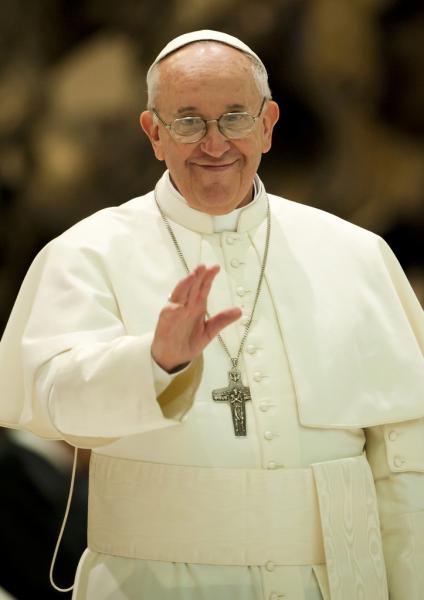A Radical First Impression Of Pope Francis

First, there was the resignation of Pope Benedict - the first time a pope had done so of his own volition in 719 years. Then, there was the election of the Archbishop of Buenos Aires, Jorge Bergoglio, to be his successor - the first non-European and the first Jesuit to ever be elected Pope. But the most radical part of all this has not been the unusual transition, but rather the signals that Bergoglio, now known as Pope Francis, has been sending regarding his plans for reforming the Church.
In both his words and his actions, Francis has suggested a dramatic redirection for the Vatican, away from the pomp and stature for which it is famous (and famously mocked) and toward a return to Jesus' simple message of humility and love for the less fortunate.
After his election by the College of Cardinals, in his homily at the inaugural Mass, Pope Francis broke tradition by delivering off-the-cuff remarks in Italian instead of in formal Latin. The main focus of his homily was on God’s forgiving nature. Later, in another address, he encouraged members of the clergy to focus less on advancing themselves as “managers” of the church, and more on joyfully serving the poor. Francis has backed up his words with humble actions, foregoing many of the trappings traditionally associated with his new position. When shown the papal apartment, he reportedly exclaimed: “There’s room for 300 people here. I don’t need all this space.”
All of this, however, pales in comparison to the move Francis made on Thursday - a move that has truly radical implications. Francis broke from tradition by choosing to have his Holy Thursday Mass at a youth prison instead of in St. Peter's Basilica, as is customary. For those unfamiliar with Catholic Holy Week traditions, one of the central components of Holy Thursday is the priest washing the feet of 12 people. This is done to re-enact Jesus' washing of the feet of his apostles at the Last Supper, an act of remarkable humility and a powerful reinforcement of his teachings. That Pope Francis chose to hold this ceremony in a youth prison starkly contrasts with previous ceremonies held in elaborate Vatican chapels. But Pope Francis was only getting started. Two women, for the first time ever, were included in the 12 people whose feet were washed by the Pope at this service, and one of these women was not even a Catholic; she was a Muslim.
The decision to include women in the foot-washing ceremony was flat-out revolutionary. First of all, Pope Francis blatantly broke the church’s official rules: "The church's liturgical law holds that only men can participate in the rite, given that Jesus' apostles were all male. Priests and bishops have routinely petitioned for exemptions to include women, but the law is clear." Popes, it has been pointed out, can do whatever they like as the leaders of the church since there are no checks on their power. So, Pope Francis is technically allowed to change the ceremony if he chooses. However, the fact that he chose to circumvent the established rules so soon into his papacy sets a precedent that is as alarming for traditionalists as it is hopeful for progressives; namely, that Pope Francis does not feed constrained by existing church laws now that he is Pope. It’s clear from both the man’s words and his actions that he is not comfortable with the status quo of the church, and that he is willing to reform what he does not like.
And while that alone would be dramatic, this is much more than just a case of semantic deviation from tradition - it’s a complete undercutting of traditionalist Catholic arguments for the role of the genders in the Catholic Church. Men are the only ones allowed to have their feet washed in this liturgy, because all the apostles were male. This very literal interpretation seems to miss the larger point that Jesus was making by washing the feet of his apostles, but up until now, the “male apostles” argument as been the accepted position of the Church on the matter. Pope Francis made it very clear that it is not a position he feels has merit.
This has implications far beyond Holy Week. What else do the Catholic Church and its traditional factions use the “male apostles” argument to support but the men-only priesthood that is a tenet of the Catholic Church. By disregarding the supposed importance of the fact that Jesus’ apostles were all men, the new Pope, intentionally or unintentionally, greatly undermined the argument for excluding women from the priesthood.
This is not to say that Pope Francis is going to open the priesthood to woman - that seems like it would be too extreme of a departure from tradition, and he himself has said that he does not support that particular change. But he does not seem to have any use for the traditional justifications for elevating men over women, and he certainly appears to be willing to revolutionize the role of women in the Church.
His Christ-like message of caring for the less fortunate rather than reveling in the pomp of the Vatican’s luxuries, combined with his reformatory attitudes, will be welcome to progressive Catholics and should make for a fascinating papacy that could affect the Catholic Church in historic proportions for years to come.
Reach Contributor Daniel Lewin here.



